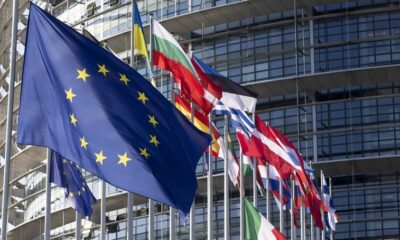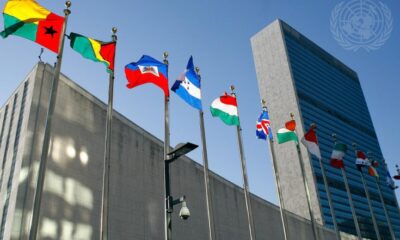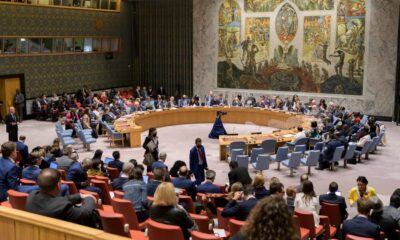Behind the News
Behind the News: All the backstories to our major news this week
Published
1 year agoon

Over the past week, there were many important stories from around the African continent, and we served you some of the most topical ones.
Here is a rundown of the backstories to some of the biggest news stories in Africa that we covered during the week:
South Africa: Msimang returns but ANC’s cracks remain
The controversies around South Africa’s ruling party, the African National Congress (ANC), took on a fresh dimension during the week as the party announced that veteran member, Mavuso Msimang, had withdrawn his resignation from the party. Msimang resigned last week, citing “endemic corruption,” and insisted he would continue to speak against any malfeasance impacting the interests of society.
The party is divided and has been in the middle of a leadership crisis and dwindling public support, which could decide whether to keep the current president in power, drastically changing the political landscape in the country as the ANC hopes to retain power in next year’s election.
In a scandal surrounding his handling of substantial amounts of foreign currency pilfered from his prize game farm, President Ramaphosa is being challenged for the leadership of both the party and the nation. The ANC has dominated national politics since the country’s democratic transition in 1994, but in the last three national elections, voter support has been declining. The party has also been losing some of its strongholds since the local elections in 2016.
The so-called “radical economic transformation (RET)” faction, which opposes Ramaphosa almost constantly and seeks to overthrow him, is one factor in the party’s struggle. According to Southall, the faction within the ANC is “destined to remain a powerful bloc,” which will limit Ramaphosa’s ability to lead and advance friction-free governance and the economy.
Recent evidence of the crisis was the announcement on Friday by former president Jacob Zuma, another strong force within the party, where he declared a new party named uMkhonto we Sizwe (MK), meaning spear of the nation, which is the same name as the former armed wing of the ANC.
Next year, Africa’s most industrialised nation will have its seventh election held under the conditions of universal adult suffrage since the end of the apartheid era in 1994. The ANC will contend with Democratic Alliance’s John Steenhuisen, Economic Freedom Fighter’s Julius Malema, and Inkatha Freedom Party’s Velenkosini Hlabisa, amongst other candidates, in the election. Will Nelson Mandela’s party finally lose its grip on South Africa?
Senegal’s Sonko finally wins big in court
After a year of back and forth in a protracted legal battle, Senegalese opposition leader, Ousmane Sonko, was cleared by the court to run in next year’s presidential elections. A tribunal in Ziguinchor, a city in the south, ordered the electoral commission weeks earlier to put Sonko back on the voter list.
His lawyer, Cire Cledor Ly, remarked after a judgement that declared the embattled politician fit to run: “We have confidence in the justice system. This decision doesn’t surprise us. We were just afraid that they might use force against us. But this country won’t go anywhere if justice doesn’t work”.
In his last episode at court four weeks ago, a court of the West African political bloc, ECOWAS, rejected Sonko’s claim that the state had treated him unfairly. The Senegalese government has been in a legal battle with the jailed opposition politician who recently lost a case claiming the state violated his human rights.
Uncertainty around the likely aspiration of President Macky Sall to run for an unprecedented third term has been one of the triggers of violence in the West African country, but the crisis subsided when Sall announced he would not be running in the election.
Over the last two years, Sonko has been involved in many court cases on allegations of rape and libel, both of which he denies. His various legal troubles have triggered violent demonstrations as his followers, who have held protests throughout the year that have sometimes led to deadly clashes with police, accuse President Macky Sall of trying to disqualify Sonko from next year’s presidential election.
Several political parties have declared their intention to seek public office in 2024; however, to move forward with the sponsorship phase, they must first garner enough public support—between 0.8 and 1% of the electorate—to sign on to support a presidential candidate. A minimum of 2,000 sponsorships must be obtained for each of Senegal’s fourteen regions to gather these signatures. Sonko remains a popular candidate who won’t struggle with public sponsorship, but there is another legal hurdle that must be crossed: his Pastef party remains suspended.
Will Niger’s new alliance hold?
Amidst the recent surge in military interregnums in the West African sub-region, regional bloc, the Economic Community of West African States (ECOWAS), has hinted that Niger, which became the fifth country in the region to have a democratically elected president ousted in July, is open to a return to democracy.
Togo’s foreign minister, Robert Dussey, said the military leadership has agreed to return to democratic reign with the agreement, just days after it was announced that a political and economic alliance with West African neighbours, Mali and Burkina Faso, was in consideration.
A common currency factor in the three countries and five others in the region that has a legal tender, the West African CFA franc, is a likely factor in the proposed alliance. “The Alliance of Sahel States… is a defence alliance a priori, but which will evolve towards an economic alliance and much more,” Traore said.
The three continue to team up to withstand pressure for a democratic return, and have dubbed their new union, the Alliance of Sahel States (AES). They would become even more isolated if they were to leave the eight-member West African monetary union and adopt a new currency. They have also endured a series of sanctions from a variety of international bodies, and tension grows as the World Bank recently warned that the latest coup may complicate issues around Nigeria and other West African nations’ food markets.
Currently, there are eight RECs recognised by the African Union (AU), each established under a separate regional treaty. They include the Arab Maghreb Union (AMU), the Common Market for Eastern and Southern Africa (COMESA), the Community of Sahel-Saharan States (CEN-SAD), the East African Community (EAC), the Economic Community of Central African States (ECCAS), the Economic Community of West African States (ECOWAS), the Intergovernmental Authority on Development (IGAD), and the Southern African Development Community (SADC). It is yet to be seen if the AEC will be a welcomed idea by the AU.
Beyond the military factor in the formation of the alliance, it is capable of triggering more economic engagements between them, a consideration that has been clamoured for by observers.
Nigeria: Foreign firms’ exit continues as fears mount over possible FDI shortage crisis
Africa’s largest economy, Nigeria, is still experiencing an exodus of foreign firms operating on its soil. The latest is the Pan-African e-commerce platform, Jumia, which announced plans to end its food delivery business, Jumia Food, in Nigeria and seven other African countries by the end of the year.
The six other countries that would be impacted are Ivory Coast, Kenya, Uganda, Morocco, Tunisia, Algeria, and Algeria, the company said in a statement.
Recently, Nigeria has suffered the exit of high-profile firms amidst rising operating costs. Perennially, Nigeria’s underdeveloped power sector is a bottleneck to broad-based economic development and forces most businesses to generate a significant portion of their electricity. The forex market instability and cost of production hike have massively impacted businesses as well.
Equinor, a major global player in the upstream oil sector, and Procter & Gamble, a major global player in fast-moving consumer goods, or FMCG, are among the recent exits for which a study revealed Nigeria’s economy is expected to lose $335 million (about N310 billion) as a result.
One of the issues around the exit has been difficulty in fund repatriation by the firms as the country had recently restricted access to foreign currency for imports and for investors seeking to repatriate their profits due to a shortage of dollars. Nigeria gets about 90% of its foreign exchange from oil but is struggling to produce due to theft and years of underinvestment.
You may like
-


EU withdraws Niger diplomat after junta accuses it of mismanaging aid
-


Behind the News: All the backstories to our major news this week
-


Behind the News: All the backstories to our major news this week
-


-


French journalist under watch by Mali, Burkina Faso, Niger juntas over jihadist analysis
-


Behind the News: All the backstories to our major news this week
Behind the News
Behind the News: All the backstories to our major news this week
Published
3 months agoon
October 18, 2024
Over the past week, many important stories from around the African continent were published, and we served you some of the most topical ones.
Here is a rundown of the backstories to some of the biggest news in Africa that we covered during the week:
Another look at Africa’s debt crisis
Conversations around Africa’s public debt were on the table during the week as Achim Steiner, administrator of the United Nations Development Programme, stated on Monday that the world’s poorest countries were unable to meet sustainable development targets because they had to prioritise debt payments over investments.
Addressing a gathering in Hamburg, Steiner asserted that the world financial crisis was impeding countries’ ability to accomplish the objectives, which include eradicating hunger and poverty, increasing access to healthcare and education, providing sustainable energy, and protecting biodiversity.
Since the COVID-19 pandemic’s pervasive effects on economies, the majority of the continent’s nations have suffered with both internal and international debt; yet, few have achieved much in the fight for debt restructuring under the G20 framework.
Numerous African nations, including Egypt, Tunisia, Nigeria, Ghana, Zambia, and others, are struggling with significant foreign debt. Together with Zambia and Ghana, Ethiopia will be a part of a thorough restructuring known as the “Common Framework.”
At the opening ceremony of the annual African Union summit in Ethiopia last year, UN Secretary-General Antonio Guterres made the case for changes to the international financial system’s structure to better meet the requirements of developing nations.
Africa’s whole external governmental debt as of 2021 was 726.55 billion USD. The amount of foreign public debt increased from 696.69 billion dollars in comparison to the previous year.
Concerns are being raised by the rising debt levels in Africa, which could not only hinder economic growth but also make repayment nearly difficult for many of these nations. This begs an important question: When does debt stop being beneficial and instead start to negatively impact a nation’s economic performance?
Kenya remains committed to Haiti, but what does it stand to gain?
Kenya will support an international anti-gang effort in Haiti next month by dispatching an additional 600 police officers there. Haiti’s prime minister was in Kenya to expedite the deployment of the military.
At least eleven countries have pledged to send more than 2,900 soldiers to participate in the Multinational Security Support (MSS), led by Kenya.
Kenya, whose participation in international peacekeeping missions is longstanding, declared earlier this year that it would be deploying 1,000 police personnel, citing as a starting point its assistance to a bordering country.
Approximately 600,000 individuals have been internally displaced due to gang conflict, and hundreds of thousands of aspiring migrants have been deported back to Haiti, where approximately 5 million people are facing extreme famine. October marks the end of the mission’s first 12-month term. As gang violence worsened in 2022, Haiti turned for the first time to foreign assistance.
Nevertheless, it failed to identify a leader prepared to assume the helm and numerous foreign governments were reluctant to back the unelected administration in the desperately poor nation.
Kenya gains significant political value by sending its troops to Haiti on the international scene. Kenya has gained international recognition as a trustworthy ally that is eager to assist other nations. The mission opens up various opportunities. Prior to deployment, Kenyan law enforcement forces will receive specialist training and equipment. In the long term, this will increase the force’s capacity. Of course, there are monetary rewards as the participating nations receive allocations of resources. Because troops will receive additional pay, officers are very interested in being deployed overseas.
Cameroon: ‘Healthy’ Biya remains out of sight
Cameroon’s president, Paul Biya can now be likened to the proverbial cat with nine lives as the 91-year-old has remained “healthy” following latest reports of his death during the week. Rumours have been circulating about Cameroonian President Paul Biya’s possible death in a military hospital in France due to his extended absence. This rumour stems from Biya’s prolonged absence following the September China-Africa Summit when he was anticipated to head back to Cameroon almost away.
As of November 6, 1982, Biya, who is 91 years old, has been in office for 42 years. He is the oldest head of state in Africa, the longest-lasting non-royal national leader worldwide, and the second-longest serving president overall. According to rumours, Biya’s oldest son Franck Emmanuel Biya may be named as his replacement for “continuity” in France.
Since its political independence from France and Britain in the early 1960s, Cameroon has only had two presidents. The country is currently dealing with two serious crises: a deadly Boko Haram insurgency in the north and a separatist conflict that has claimed thousands of lives.
President Biya is one of several long-serving African leaders, including Yoweri Museveni of Uganda, who has been in office since 1982, and Teodoro Obiang Nguema Mbasogo of Equatorial Guinea, Rwanda’s Paul Kagame is also gradually evolving into the group.
Things get tougher for embattled Kenyan Deputy President
During the week, the deputy president of Kenya was impeached by the National Assembly due to charges of corruption and abuse of power. In a vote held Tuesday night, lawmakers decisively decided to remove Rigathi Gachagua from office. The Senate will now decide what will happen to the deputy president.
Parliament adopted a proposal to remove Kenya’s deputy president from office, and on Wednesday, the matter was brought to the Senate for consideration. The National Assembly heard a nearly ninety-minute defence of troubled deputy president Rigathi Gachagua and his allies prior to the vote.
A surge of protests targeting President Ruto’s government has been occurring in Kenya over the last four months due to accusations of corruption made by certain lawmakers and government officials. High taxation and the parliament’s purported inability to act independently of the president were other issues that Kenyans objected to. Gachagua refutes the accusations made by certain lawmakers, who claim that the deputy president assisted in planning rallies against the government.
He supported Ruto in his election victory in 2022 and assisted in obtaining a sizable portion of the vote from the populated central Kenya region. Gachagua, however, has mentioned feeling marginalised in recent months, despite extensive claims in the local media that he and Ruto have strained political ties.
After widespread protests over unpopular tax increases in June and July that claimed more than 50 lives, Ruto sacked the majority of his cabinet and appointed members of the main opposition.
Gachagua infuriated many in Ruto’s coalition by comparing the government to a business and implying that people who supported the coalition had first claim to development projects and jobs in the public sector. Ruto has not yet publicly commented on the impeachment proceedings.
Behind the News
Behind the News: All the backstories to our major news this week
Published
4 months agoon
October 3, 2024
Over the past week, many important stories from around the African continent have been published, and we have served you some of the most topical ones.
Here is a rundown of the backstories of some of the biggest news in Africa that we covered during the week:
Musings on CBN rates across Africa: Ghana, Nigeria, and South Africa
During the week, many African countries announced monetary policy decisions. The Central Bank of Nigeria decided unanimously on Tuesday to raise its benchmark interest rate by an additional 50 basis points, to a new record high of 27.25%. This is the sixth hike in a row this year. The decision was made in an effort to reduce inflation, strengthen the naira, and draw in capital. Governor Olayemi Cardoso reaffirmed the bank’s commitment to controlling inflation and underlined how several rate hikes have contributed to its moderation.
Nigeria’s West Africa neighbour followed suit on Friday as the Bank of Ghana reduced its benchmark monetary policy rate by 200 points to 27% at a normal meeting. With inflation having slowed and disinflationary pressures mounting, this is the first decline in eight months and the steepest since March 2018. August 2024 saw a fifth consecutive month of decline in Ghana’s annual consumer inflation, which was still much higher than the central bank’s medium-term target range of 6% to 10%. The country’s annual inflation rate dropped to a nearly two-and-a-half-year low of 20.4% from 20.9% in July.
A week prior, as anticipated, the South African Reserve Bank decreased its benchmark interest rate by 25 basis points to 8% after holding seven consecutive meetings at a 15-year high of 8.25%. As price pressures decreased, the SARB is loosening policy for the first time since the epidemic in 2020
As monetary varying shifts across the continent continue, African nations are still facing numerous severe shocks and significant structural challenges, such as rising food and energy prices brought on by geopolitical tensions like Russia’s invasion of Ukraine, climate issues that impact agriculture and energy production, and ongoing political instability.
Africa’s real GDP growth slowed to 3.1% in 2023 from 4.1% in 2022 as a result of this difficult climate. With growth predicted to reach 3.7% in 2024 and 4.3% in 2025, the economic picture is projected to improve going ahead, underscoring the resilience of African countries.
Zambia and its post-drought plans
Zambia’s finance minister, Situmbeko Musokotwane stated on Friday that the nation intends to quickly recover from its worst drought in living memory and cut its budget deficit in half the following year.
The minister stated in a budget address that the copper producer hopes for a 6.6% growth in 2025, as opposed to a projected 2.3% increase in 2024. The country is aiming for a speedy recovery. as the government crop assessment data shows that over nine million people are affected in 84 of the 117 districts after suffering through the driest farming season in over forty years, which has led to considerable crop losses, an increase in livestock deaths, and worsening poverty,
Real GDP increased gradually between 2022 and 2023, from 5.2% to 5.8%. The supply side was driven by mining and quarrying, wholesale and retail commerce, and agriculture; the demand side was driven by consumer and business spending. Food prices, transit expenses, and the nominal exchange rate are the key drivers of inflation, which is expected to remain elevated and reach 11.0% and 10.9% at the end of 2022 and 2023, respectively.
The economic challenges faced by Zambia are exacerbated by the drought, especially when considering its debt load. Its debt restructuring talks under the G20 Common Framework have progressed far more slowly than was originally anticipated when the Common Framework was first proposed.
In 2017, Zambia was placed under debt distress, and as a result, non-concessional lending from multilateral development banks was discontinued. It’s possible that by overestimating sovereign risks, the main credit rating firms exacerbated the debt crisis and dealing with a post-drought crisis might just be another “too high hurdle”
As the World Bank and Uganda LGBTQ saga continues
The World Bank is taking more action in support of Uganda’s LGBTQ community. The global lender announced on Wednesday that it is implementing steps to guarantee that lenders to Uganda are not subjected to discrimination due to a severe anti-gay law. According to a World Bank representative, both new and continuing projects would be subject to the procedures, which also include an impartial monitoring system to guarantee compliance.
Same-sex partnerships are forbidden and punishable by life in prison; similarly, anyone convicted of “aggravated homosexuality” faces the death penalty. The Anti-Homosexuality Act (AHA) was passed by Uganda, a largely conservative nation, in May of last year and it has led to considerable Western censure and US penalties.
Other than Uganda, several African nations have strict laws that discriminate against individuals who identify as LGBTQ. Hakainde Hichilema, the president of Zambia, issued a warning in March to supporters of the LGBTQ movement to stop endorsing homosexuality. He also asked that Zambia “maintain laws that abhor alien orientations like gayism and lesbianism.”
South Africa, which has a constitution that forbids discrimination based on sexual orientation, was the first and only African nation to legalise same-sex marriage in 2006. Some African nations, such as Angola, Mozambique, Botswana, Lesotho, Mauritius, and Seychelles, have laws that are favourable to the continent’s population but Uganda appears to be unbothered or tempted despite the many causes and costs of its anti-gay stand.
Ahead of Tunisia’s presidential election
During the week, another Tunisian presidential candidate Ayachi Zammel was convicted and sentenced to six months imprisonment for using “fraudulent certificates” as opposition voices in the North African country continue on attack as President Saied positions himself for what is likely to be a reelection, as all but one of the opposition candidates are either incarcerated or have had their eligibility ruled invalid by the Tunisian electoral commission.
On September 19, a third candidate who had received the election commission’s approval was sentenced to 20 months in prison. Saied, who is currently running for reelection for a second five-year term, was originally elected in 2019 as an anti-establishment candidate who pledged to combat poverty and eradicate corruption. However, in 2021 he declared that he would rule by decree after overthrowing Mohamed Ennaceur and the elected parliament, a move denounced as a coup by the opposition and the international community.
Additionally, he has deployed more oppressive strategies, which may indicate that he is not confident in his ability to win with conviction. His severe actions could indicate a new stage in Tunisia’s democratic backsliding and foreshadow more crackdowns and turmoil during an inevitable second term.
Meanwhile, concerns exist over potential voting turnout as well. Under Saied, Tunisia has conducted three elections, with dismal voter turnout in each. Less than one-third of voters cast ballots in favour of a new constitution that solidified Saied’s power and overthrew the 2014 charter in July 2022. After Saied dismissed the previous legislature in December 2022, only 11% of voters cast ballots for new members of parliament, which is among the lowest turnout percentages ever recorded in a national election worldwide. The next December, Saied called elections for a new second house of parliament, repeating this dubious performance.
EDITOR’S PICK


Nigeria: Marketers predict further price cut as another refinery begins operations
Oil marketers and the Nigerian Midstream and Downstream Petroleum Regulatory Authority expect refined petroleum product prices to reduce as another...


Kenya: Consumer inflation rises to 3.0% from 2.8%
Kenya’s statistics agency said on Tuesday that Kenya’s consumer price inflation increased slightly to 3.0% year-over-year in December from 2.8%...


South Africa’s Transnet’s half-year deficit hits $117m
Transnet, a state-owned logistics company in South Africa, announced on Tuesday that it had lost 2.2 billion rand ($117.48 million)...


Nigeria, China extend $2bn currency swap deal
A 15 billion yuan ($2 billion) currency-swap arrangement between China and Nigeria has been extended to boost investment and commerce...


Egypt’s central bank maintains overnight rates
As anticipated, Egypt’s central bank has maintained its overnight interest rates, stating that although inflation was predicted to drop significantly...


Illicit flows cost Nigeria, others $1.6bn daily— AfDB
According to the African Development Bank (AfDB), illicit money flows and profit shifting by multinational corporations doing business in Africa...


‘Don’t start what you can’t finish’, ex-Nigerian official replies President Tchiani
Former Nigerian Aviation Minister, Femi Fani-Kayode, has told President Abdourahamane Tchiani of Niger Republic to refrain from making infantile and...


Again, Starlink raises prices of its services in Nigeria
Elon Musk’s satellite internet service provider, Starlink, has again jacked up the prices of its services in Nigeria after an...


Former President of Moroccan club Raja sentenced to 3 years in prison
The former President of Moroccan top club, Raja Casablanca, Mohamed Aouzal, has been sentenced to three and a half years...


Zambia announces second case of Mpox as country battles cholera outbreak
The Zambian Ministry of Health has reported a second case of Monkeypox, popularly known as Mpox, in Kitwe region of...


